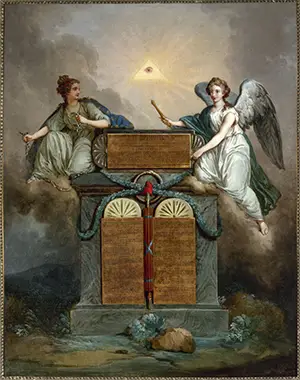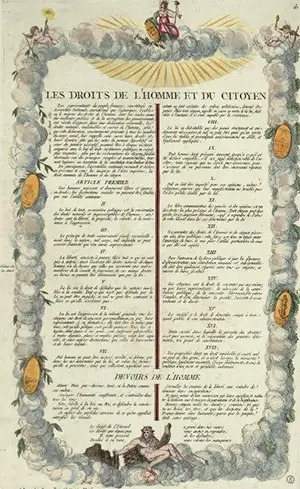The Declaration of the Rights of Man and of the Citizen
The Déclaration des Droits de l'Homme et du Cityoen (Declaration of the Rights of Man and of the Citizen) was a fundamental declaration of the sanctity of human liberties that emerged from the shadow of the French Revolution. 
The 17 Articles that made up the Declaration were the result of impassioned discussion by the National Constituent Assembly, the de facto legislature after the Storming of the Bastille and other events of the summer of 1789 created a large amount of uncertainty over the powers that King Louis XVI still had. After nearly a week of discussion, the Assembly approved the Articles, on August 26. The principal author of the Articles was the the Marquis de Lafayette, who consulted the American Thomas Jefferson, who was the principal author of the American Declaration of Independence. Building on the thoughts and writings of the major philosophes Montesquieu, Rousseau, and Voltaire, Lafayette and others delivered a manifesto rooted in the rule of law as envisioned the purpose of which was to protect the basic rights of people and to govern by the approval of the general will. Montesquieu had extolled the virtues of the separation of powers in The Spirit of Laws; this idea formed the basis of the American government as well, laid out in the U.S. Constitution, approved in 1787. Article 16 enunciates this for the French people, saying that a society that does not have such a divided government "has no constitution at all." As well, the idea of a government made up of elected representatives of the people echoed the ideas of Rousseau's arguments put forward in The Social Contract. The overarching principle of the Articles was equality. The class conflict that had dominated actions and discussions in France for the past few decades had resulted in more and more calls by peasants for the elimination of privileges that the clergy and nobility had long enjoyed; rather than having a system of these sorts of things being doled out by a king and his associates and the Church and its officers, the Assembly envisioned a society in which all, regardless of their economic or social status, could aspire to the same rights, responsibilities, and privileges. Building on the teachings of the physiocrats and also hearkening back to the writings of the English philosopher John Locke, the French authors were careful to include a legally sanctioned and recognized right to the ownership of private property. Article 17 is exclusively about this, and Article 2 includes property in a list of "the natural and imprescriptible rights of man." The Constitution of 1791 had the Declaration as its preamble. The Declaration of the Rights of Man and of the Citizen The Representatives of the French people, organized in National Assembly, considering that ignorance, forgetfulness, or contempt of the rights of man are the sole causes of public miseries and the corruption of governments, have resolved to set forth in a solemn declaration the natural, inalienable, and sacred rights of man, so that this declaration, being ever present to all the members of the social body, may unceasingly remind them of their rights and duties; in order that the acts of the legislative power, and those of the executive power, may at each moment be compared with the aim and of every political institution and thereby may be more respected; and in order that the demands of the citizens, grounded henceforth upon simple and incontestable principles, may always take the direction of maintaining the constitution and welfare of all. In consequence, the National Assembly recognizes and declares, in the presence and under the auspices of the Supreme Being, the following rights of man and citizen: Articles:
|
|
Social Studies for Kids
copyright 2002–2024
David White



 Liberty consists in the power to do anything that does not injure others; accordingly, the exercise of the rights of each man has no limits except those that secure the enjoyment of these same rights to the other members of society. These limits can be determined only by law.
Liberty consists in the power to do anything that does not injure others; accordingly, the exercise of the rights of each man has no limits except those that secure the enjoyment of these same rights to the other members of society. These limits can be determined only by law.
